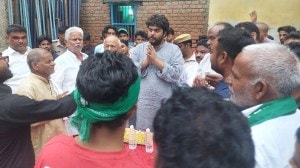Men move over as women lord over farms
NEW DELHI, MAY 3: Women farmers, who were left out of the Green Revolution, are today making a conscious effort to break the gender divid...

NEW DELHI, MAY 3: Women farmers, who were left out of the Green Revolution, are today making a conscious effort to break the gender divide — as part of government-sponsored schemes, they are learning to use the technology that brought about the Revolution in the first place.
Launched by the Government with the help of non-governmental organisations, some special schemes focus on field demonstrations, extension-oriented acitivities, and hone in on rural women’s entrepreneurial skills.
"The new technological packages are a supplement to rural technologies that have been practised over the years," says Dr Renu Swarup, Principal Scientific Officer, Department of Biotechnology.
Besides aiming to increase the participation of women in technological programmes, men are also counselled to encourage women’s participation at the decision-making level.
Though only 20 per cent of women farmers have so far benefitted from them, activists are hopeful that if the programme is sustained, a change may soon bevisible.
"When we started our joint forest management programme in 1991 in Badgodam, Haryana, no woman would come forward to attend our meetings. Today there’s a sea change, with two women managers in the joint forest operation scheme and the watershed programme”, says V Varalakshmi, biotechnologist at the Tata Energy Research Institute (TERI).
"Initially, the men were hostile to us and even apprehensive about sending women to our meeting but now, women control the irrigation network and make decisions based on our proposals in Haryana and Himachal Pradesh… The men have no qualms about this”, says Varalakshmi.
During 1997-98, 12 projects in the areas of floriculture, horticulture, sericulture, medicinal plants, livestock-based industry, food processing were started in various villages where women have been encouraged to integrate age-old methods with new time-tested ones.
On completion of the project, commercial packages will be developed to be transferred to the concerned user ministry forfurther expansion.
"We are also propagating a `bio-village concept’ wherein women can apply their skills in post-harvesting or use renewable sources of energy in their own backyards", says Dr Swarup.
Women are the agricultural database of the country as they possess complete knowhow of seed varieties, crop protection and harvesting techniques, based on their experience which has helped sustain agricultural productivity over the years, notes Dr Swarup.
"There was a realisation at the policy-making level that agricultural development strategies which targetted only the male farmers were not sustainable, neither was it possible to achieve all-round development until women farmers came to the forefront. Thus, the gender bias had to be eliminated by special schemes targeting them," says Dr Swarup.
Most of the men at the rural level are migrant labourers and their only connection with the agricultural activities is that they are landowners. Yet, over the years, they have debarred women from attending farmerprogrammes or particpate in techno demonstrations, say scientists.
This social divide has been hampering women farmers as they do not have direct access to techno-programmes, dependent as they are on half-baked knowledge passed on by the male members of their family.
But social activists and scientists are trying to bring about a gradual change through counselling and supporting schemes which would not only empower women but also result in commercial success.
The Department of Biotechnology had, last year, launched a scheme aimed at developing rural areas using technology particpation for the economic empowerment of women.
Recently, the United Nations Development Programme and Food and Agriculture Organisation, alongwith the regional unit of DOB, launched a farm programme which demonstrated proven technologies at field/farmer level.
With the help of site working groups, watersheds in different agroclimatic zones were selected where demonstration activities were carried out. The men were encouragedto bring the women along with them.
Counselling and educating women has become all the more neccessary as multinational seed companies are trying to propagate genetically terminated and altered seeds in the rural market, say activists.
"Women are the traditional seed keepers and producers. Depending on their ingenuity and experience, they have been saving seeds and guarding them from insects and moisture to reuse them the next year. But thanks to the efforts of some international seed companies, many important seed types have been lost," says Vandana Shiva, director, The Research foundation for Science, Technology and Natural Resource Policy, citing the case of Himachal Pradesh, where food crops have been replaced by fields of hybrid tomatoes.
This has happened because men who were at the forefront at the decision-making level were lured by commercial success and switched to the vegetable on the propaganda of seed companies.
But women tried to resist the move as they were aware of the `destructive’hybrid seeds and also understood the nutritive value of cereals over tomatoes, says Shiva.
Scientists warn that unless rural women farmers are not educated over the use of chemically induced seeds, precious varieties could be lost forever. Social workers are also concentrating on the problem areas like marketing agricultural produce. "Entrepreneurship skills are an important part of our training programme and in Chennai, we have set up a biotech park where rural women farmers can not only buy technological packages but are also guided on marketing techniques”, says Dr Swarup.
Though women farmers are coming forward, literacy still is a stumbling block in their advancement. Swarup suggests that interaction programmes between women farmers would go a long way in changing attitudes.
"At a recent farmer exchange programme in coastal Tamil Nadu, it was heartening to see that 20 per cent particpants of the total 40 were women and that too the ones who had come from tradtional societies from Uttar Pradesh andRajasthan," says Swarup, but notes that for complete gender bias elimination, the only key is education.



- 01
- 02
- 03
- 04
- 05




























